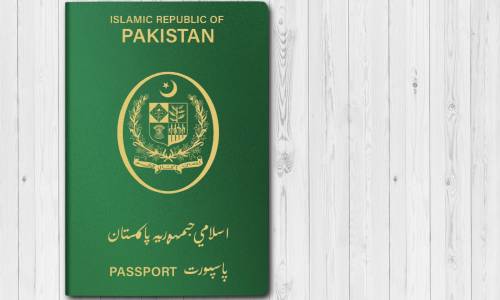ISLAMABAD: The Pakistani passport retains its position as the fourth least favorable globally in the new year, showing no improvement in its ranking over the past five years.
The data from Henley and Partners, a UK-based citizenship and residence advisory firm, reveals that the passport’s decline, starting from July last year, persists in the latest rankings where it holds the 101st position out of 104 on the Henley Passport Index.
The passport’s score is 34, indicating visa-free access to only 34 out of 227 destinations covered by the index.
Henley Passport Index, which evaluates 199 nations, utilizes data from the International Air Transport Association (IATA) to determine rankings based on the number of countries and territories accessible without a prior visa.
The 2024 Global Mobility Report by the firm discloses that the top-ranking passports belong to France, Germany, Italy, Japan, and Singapore, sharing the first position with a score of 194. France, Germany, and Italy have made a notable two-spot advancement compared to the previous year.
Finland, South Korea, and Sweden share the second spot with a score of 193, while Austria, Denmark, Ireland, and the Netherlands jointly hold the third position with a score of 192. Afghanistan maintains its position as the country with the least powerful passport, granting visa-free entry to only 28 destinations. Syria and Iraq follow as the second and third least favorable passports, allowing access to 29 and 31 destinations, respectively.
Despite outperforming Pakistan, other South Asian countries have relatively low overall rankings.
Bangladesh secures the 97th spot with visa-free access to 42 destinations, Sri Lanka is at 96 with a score of 45, and Nepal is ranked 98th with a score of 40. India stands out in the region, securing the 80th position with a score of 62.
The Pakistani passport grants visa-free access to a limited number of destinations, including Barbados, Burundi, Cambodia, Cape Verde Islands, Comoro Islands, Cook Islands, Djibouti, Dominica, Guinea-Bissau, Haiti, Kenya, Madagascar, Maldives, Micronesia, Montserrat, Mozambique, Nepal, Niue, Palau Islands, Qatar, Rwanda, Samoa, Senegal, Seychelles, Sierra Leone, Somalia, Sri Lanka, St Vincent and the Grenadines, Timor-Leste, Togo, Trinidad and Tobago, Tuvalu, and Vanuatu.
Dr. Christian H Kaelin, Chairperson of Henley and Partners, notes in a statement that while there has been a general trend toward greater travel freedom, the global mobility gap between top and bottom-ranked passports is now wider than ever. The average number of destinations accessible visa-free has nearly doubled from 58 in 2006 to 111 in 2024, highlighting the significant disparity in travel freedom between top-ranked and bottom-ranked countries.
(Islamabad51_Newdesk)











